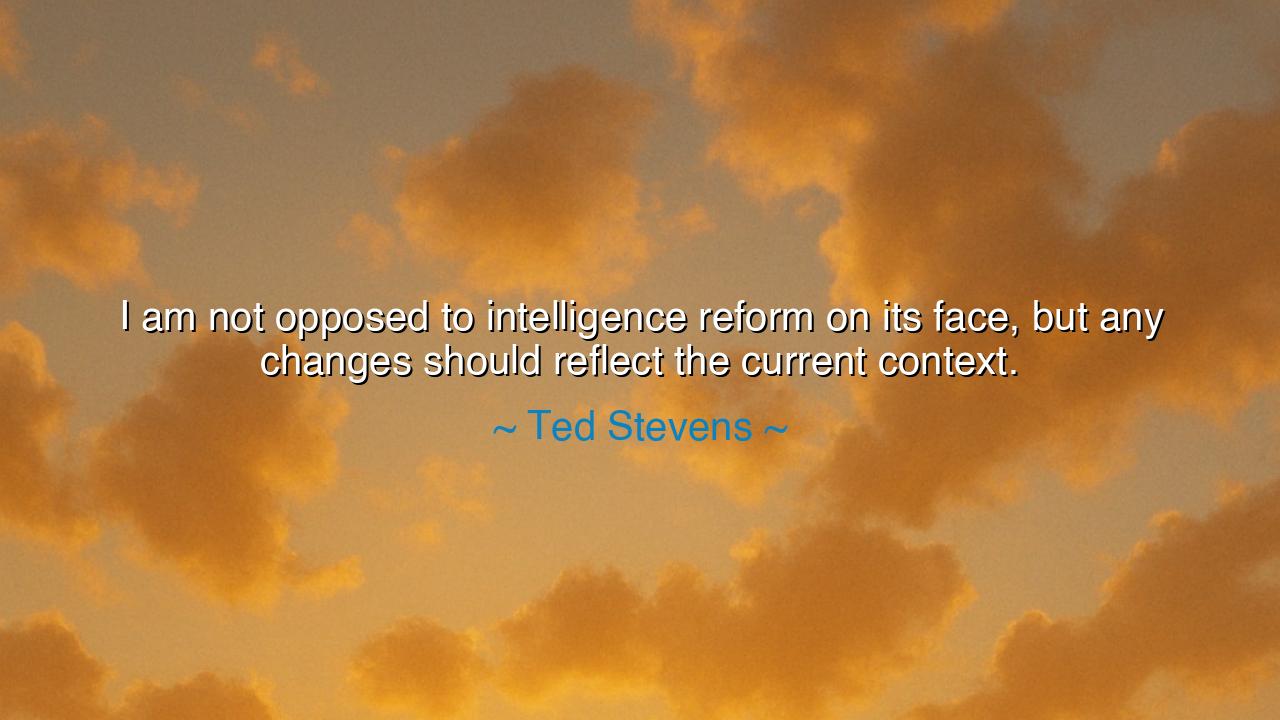
I am not opposed to intelligence reform on its face, but any
I am not opposed to intelligence reform on its face, but any changes should reflect the current context.






In the words of Ted Stevens, "I am not opposed to intelligence reform on its face, but any changes should reflect the current context," we find a profound call for balance and wisdom in times of change. Stevens’ statement emphasizes that while reform is often necessary, it should not be done hastily or without careful thought about the present moment and the realities that shape it. Reform must be adaptive and responsive, acknowledging the complexities of the time in which it occurs. It is not enough to simply seek change for its own sake; it must be grounded in a clear understanding of the conditions that demand it.
This sentiment echoes the ancient wisdom of Plato, who believed that true reform arises from knowledge and reflection. Plato’s idea of the philosopher-king was not a ruler who imposed change recklessly but one who governed with a deep understanding of the current state of affairs. The philosopher-king’s decisions were rooted in the reality of the time, shaped by careful thought and a vision for the future that acknowledged both the strengths and weaknesses of the present. In this sense, Stevens’ caution against unchecked reform is not a rejection of change, but a plea for it to be measured and attuned to the realities it seeks to address.
Consider the story of the great Roman statesman Cicero, who, during the fall of the Roman Republic, sought to reform the government and the laws that had begun to falter under the weight of corruption and internal strife. Cicero did not call for immediate or sweeping reforms, but instead for a return to principles that reflected the current context of Rome’s fractured political landscape. He understood that reform must take into account not only the ideals of a republic, but also the pragmatics of how those ideals could be restored in a world that had changed. Cicero’s advocacy for careful reform based on the realities of Rome’s present condition is a timeless example of the balance Stevens speaks of—a reminder that the best reforms are those that are rooted in wisdom and shaped by the times.
The notion that reform should be in harmony with the current context also suggests that intelligence reform, in particular, must acknowledge the challenges of the modern world. For Stevens, the rapid evolution of global threats, the rise of cybersecurity challenges, and the complexity of modern warfare required a more nuanced approach to how intelligence agencies operated. To simply overhaul these agencies without a clear understanding of the modern landscape would risk creating chaos in a system that is already under immense pressure. This is a lesson that the ancients knew well: change for the sake of change often results in greater disorder. It is adaptation, not mere alteration, that leads to true progress.
In more recent history, the post-9/11 reforms to the U.S. intelligence community provide a real-world example of Stevens’ caution. The attacks on September 11, 2001, shocked the world, and in their aftermath, there was a swift push for dramatic reforms to prevent such an event from occurring again. The creation of the Department of Homeland Security and the intelligence reform that followed were not simply reactions, but a careful attempt to adapt to the new context of global terrorism. However, those reforms were not without their challenges, as they had to balance the need for better coordination among agencies with the protection of civil liberties. The success of these reforms hinged not just on change, but on understanding the context of the threat they were responding to.
The key lesson in Stevens’ words is not merely about intelligence, but about how we approach any reform in our lives or societies. We must understand that change should not be pursued blindly, nor should we be afraid of reform simply because it requires careful reflection. Whether we seek personal growth, societal change, or institutional reform, it is crucial that we take the time to truly understand the current context before acting. Change is a tool, not a solution in itself. It must be wielded with wisdom and a deep awareness of the conditions that call for it.
As we move forward in our own lives, let us remember that the path to improvement is rarely straightforward. We must not act out of impulse or desire for superficial transformation, but with the deep understanding that true reform is about alignment with the present, not the past. Like Stevens’ plea for thoughtful intelligence reform, we must strive for pragmatic change, grounded in reality, that enhances our lives, societies, and institutions. Let us be mindful of the context we live in, and shape our reforms to not only address the immediate challenges but to set us on a path that leads to sustained progress and wisdom.






AAdministratorAdministrator
Welcome, honored guests. Please leave a comment, we will respond soon